欧阳修《醉翁亭记》原文及翻译
《醉翁亭记》原文、译文、注释及赏析
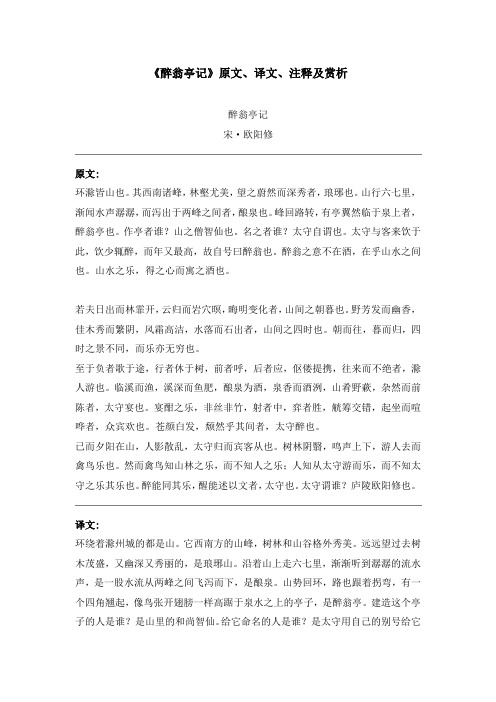
《醉翁亭记》原文、译文、注释及赏析醉翁亭记宋·欧阳修原文:环滁皆山也。
其西南诸峰,林壑尤美,望之蔚然而深秀者,琅琊也。
山行六七里,渐闻水声潺潺,而泻出于两峰之间者,酿泉也。
峰回路转,有亭翼然临于泉上者,醉翁亭也。
作亭者谁?山之僧智仙也。
名之者谁?太守自谓也。
太守与客来饮于此,饮少辄醉,而年又最高,故自号曰醉翁也。
醉翁之意不在酒,在乎山水之间也。
山水之乐,得之心而寓之酒也。
若夫日出而林霏开,云归而岩穴暝,晦明变化者,山间之朝暮也。
野芳发而幽香,佳木秀而繁阴,风霜高洁,水落而石出者,山间之四时也。
朝而往,暮而归,四时之景不同,而乐亦无穷也。
至于负者歌于途,行者休于树,前者呼,后者应,伛偻提携,往来而不绝者,滁人游也。
临溪而渔,溪深而鱼肥,酿泉为酒,泉香而酒洌,山肴野蔌,杂然而前陈者,太守宴也。
宴酣之乐,非丝非竹,射者中,弈者胜,觥筹交错,起坐而喧哗者,众宾欢也。
苍颜白发,颓然乎其间者,太守醉也。
已而夕阳在山,人影散乱,太守归而宾客从也。
树林阴翳,鸣声上下,游人去而禽鸟乐也。
然而禽鸟知山林之乐,而不知人之乐;人知从太守游而乐,而不知太守之乐其乐也。
醉能同其乐,醒能述以文者,太守也。
太守谓谁?庐陵欧阳修也。
译文:环绕着滁州城的都是山。
它西南方的山峰,树林和山谷格外秀美。
远远望过去树木茂盛,又幽深又秀丽的,是琅琊山。
沿着山上走六七里,渐渐听到潺潺的流水声,是一股水流从两峰之间飞泻而下,是酿泉。
山势回环,路也跟着拐弯,有一个四角翘起,像鸟张开翅膀一样高踞于泉水之上的亭子,是醉翁亭。
建造这个亭子的人是谁?是山里的和尚智仙。
给它命名的人是谁?是太守用自己的别号给它命名的。
太守和宾客来这里饮酒,喝了一点就醉了,而且年龄又是最大,所以给自己起了个别号叫「醉翁」。
醉翁的情趣不在喝酒上,而在欣赏山水之间的美景。
欣赏山水的乐趣,领会在心里,寄托在喝酒上。
又如太阳出来而树林的雾气消散了;烟雲聚拢来,山谷就显得昏暗了。
《醉翁亭记》原文翻译注解

《醉翁亭记》原文翻译注解《醉翁亭记》原文翻译注解引导语:《醉翁亭记》是北宋文学家欧阳修创作的一篇散文。
作者醉在两处:一是陶醉于山水美景之中,二是陶醉于与民同乐之中。
由此,小编将带大家欣赏一下诗人欧阳修在醉翁亭的陶醉之情吧!【作品原文】环1滁2、3皆4山也。
其5西南诸峰,林壑6尤7美。
望之蔚然8而深秀者9,琅琊也。
山10行六七里,渐闻水声潺潺11而泻出于两峰之间者,酿泉12也。
峰回13路转14,有亭翼然15、16临17于18泉上者,醉翁亭也。
作19亭者谁?山之僧智仙也。
名20之者谁?太守自谓21也。
太守与客来饮于此,饮少辄22醉,而年又最高23,故自号24曰25醉翁也。
醉翁之意26不在酒,在乎27山水之间也。
山水之乐,得28之心而寓29之酒也。
若夫30日出而林霏31开32,云归33而岩穴暝34,晦35明36变化者,山间之朝暮也。
野芳37发38而幽香,佳木秀39而繁阴40、41,风霜高洁42,水落而石出者,山间之四时也。
朝而往,暮而归,四时之景不同,而乐亦无穷也。
至于43负者44歌于途,行者休于树45,前者呼,后者应,伛偻46提携47,往来而不绝者,滁人游也。
临48溪而渔49,溪深而鱼肥。
酿泉50为酒,泉香而酒洌51;山肴52野蔌53,杂然54而前陈55者,太守宴也。
宴酣56之乐,非丝57非竹58,射59者中,弈60者胜,觥61筹62交错63,起坐而喧哗者,众宾欢也。
苍颜64白发,颓然65乎其间者,太守醉也。
已而66夕阳在山,人影散乱,太守归67而宾客从也。
树林阴翳68、69,鸣声上下70,游人去而禽鸟乐也。
然而禽鸟知山林之乐,而不知人之乐;人知从太守游而乐,而不知太守之乐其乐71也。
醉能同其乐,醒能述以文者72,太守也。
太守谓73谁?庐陵74欧阳修也。
【注释译文】【词句注释】1. 环:环绕。
怀禅微刻《醉翁亭记》怀禅微刻《醉翁亭记》2. 滁(chú):滁州,今安徽省东部。
3. 环滁:环绕着滁州城。
北宋欧阳修《醉翁亭记》原文、译文及注释
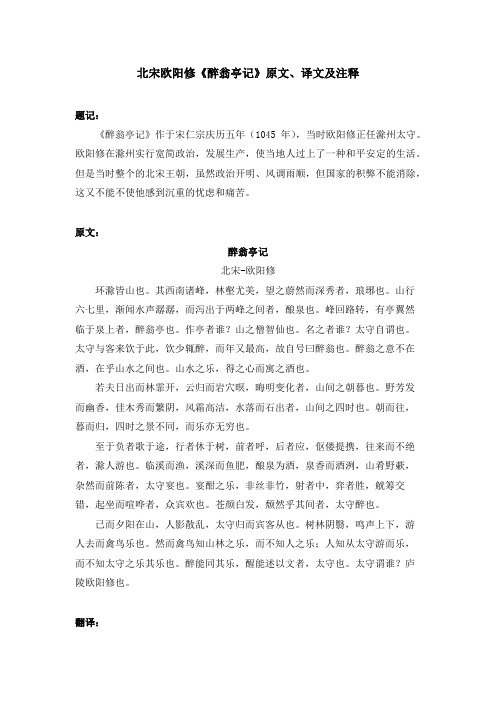
北宋欧阳修《醉翁亭记》原文、译文及注释题记:《醉翁亭记》作于宋仁宗庆历五年(1045年),当时欧阳修正任滁州太守。
欧阳修在滁州实行宽简政治,发展生产,使当地人过上了一种和平安定的生活。
但是当时整个的北宋王朝,虽然政治开明、风调雨顺,但国家的积弊不能消除,这又不能不使他感到沉重的忧虑和痛苦。
原文:醉翁亭记北宋-欧阳修环滁皆山也。
其西南诸峰,林壑尤美,望之蔚然而深秀者,琅琊也。
山行六七里,渐闻水声潺潺,而泻出于两峰之间者,酿泉也。
峰回路转,有亭翼然临于泉上者,醉翁亭也。
作亭者谁?山之僧智仙也。
名之者谁?太守自谓也。
太守与客来饮于此,饮少辄醉,而年又最高,故自号曰醉翁也。
醉翁之意不在酒,在乎山水之间也。
山水之乐,得之心而寓之酒也。
若夫日出而林霏开,云归而岩穴暝,晦明变化者,山间之朝暮也。
野芳发而幽香,佳木秀而繁阴,风霜高洁,水落而石出者,山间之四时也。
朝而往,暮而归,四时之景不同,而乐亦无穷也。
至于负者歌于途,行者休于树,前者呼,后者应,伛偻提携,往来而不绝者,滁人游也。
临溪而渔,溪深而鱼肥,酿泉为酒,泉香而酒洌,山肴野蔌,杂然而前陈者,太守宴也。
宴酣之乐,非丝非竹,射者中,弈者胜,觥筹交错,起坐而喧哗者,众宾欢也。
苍颜白发,颓然乎其间者,太守醉也。
已而夕阳在山,人影散乱,太守归而宾客从也。
树林阴翳,鸣声上下,游人去而禽鸟乐也。
然而禽鸟知山林之乐,而不知人之乐;人知从太守游而乐,而不知太守之乐其乐也。
醉能同其乐,醒能述以文者,太守也。
太守谓谁?庐陵欧阳修也。
翻译:环滁皆山也。
群山环绕着滁州。
其西南诸峰,林壑尤美,望之蔚然而深秀者,琅琊也。
其中西南的几座山峰,树林和山谷特别美丽,一眼望去,树木茂盛,深邃而美丽,那就是琅琊山。
山行六七里,渐闻水声潺潺,而泻出于两峰之间者,酿泉也。
沿着山路向前走六七里,渐渐能听到潺潺的水流声,一条溪流从两座山之间倾泻而出,那是酿泉。
峰回路转,有亭翼然临于泉上者,醉翁亭也。
这弯溪流沿着山峰回转,突然有一个亭子像鸟儿一样展翅盘旋于泉上,那就是醉翁亭。
《醉翁亭记》原文、翻译及赏析

《醉翁亭记》原文、翻译及赏析《醉翁亭记》欧阳修〔宋代〕原文:环滁皆山也。
其西南诸峰,林壑尤美,望之蔚然而深秀者,琅琊也。
山行六七里,渐闻水声潺潺,而泻出于两峰之间者,酿泉也。
峰回路转,有亭翼然临于泉上者,醉翁亭也。
作亭者谁?山之僧曰智仙也。
名之者谁?太守自谓也。
太守与客来饮于此,饮少辄醉,而年又最高,故自号曰醉翁也。
醉翁之意不在酒,在乎山水之间也。
山水之乐,得之心而寓之酒也。
(山之僧曰智仙也一作:山之僧智仙也)若夫日出而林霏开,云归而岩穴暝,晦明变化者,山间之朝暮也。
野芳发而幽香,佳木秀而繁阴,风霜高洁,水落而石出者,山间之四时也。
朝而往,暮而归,四时之景不同,而乐亦无穷也。
至于负者歌于途,行者休于树,前者呼,后者应,伛偻提携,往来而不绝者,滁人游也。
临溪而渔,溪深而鱼肥,酿泉为酒,泉香而酒洌,山肴野蔌,杂然而前陈者,太守宴也。
宴酣之乐,非丝非竹,射者中,弈者胜,觥筹交错,起坐而喧哗者,众宾欢也。
苍颜白发,颓然乎其间者,太守醉也。
已而夕阳在山,人影散乱,太守归而宾客从也。
树林阴翳,鸣声上下,游人去而禽鸟乐也。
然而禽鸟知山林之乐,而不知人之乐;人知从太守游而乐,而不知太守之乐其乐也。
醉能同其乐,醒能述以文者,太守也。
太守谓谁?庐陵欧阳修也。
译文:环绕滁州的都是山。
那西南方的几座山峰,树林和山谷格外秀美。
一眼望去,树木茂盛,又幽深又秀丽的,是琅琊山。
沿着山路走六七里,渐渐听到潺潺的流水声,看到流水从两座山峰之间倾泻而出的,那是酿泉。
泉水沿着山峰折绕,沿着山路拐弯,有一座亭子像飞鸟展翅似地,飞架在泉上,那就是醉翁亭。
建造这亭子的是谁呢?是山上的和尚智仙。
给它取名的又是谁呢?太守用自己的别号(醉翁)来命名。
太守和他的宾客们来这儿饮酒,只喝一点儿就醉了;而且年纪又最大,所以自号“醉翁”。
醉翁的情趣不在于喝酒,而在欣赏山水的美景。
欣赏山水美景的乐趣,领会在心里,寄托在酒上。
至于太阳升起,树林里的雾气散开,云雾聚拢,山谷就显得昏暗了;朝则自暗而明,暮则自明而暗,或暗或明,变化不一,这就是山中的朝暮。
《醉翁亭记》原文及译文

《醉翁亭记》原文及译文《醉翁亭记》是北宋文学家欧阳修创作的一篇优美的散文。
这篇文章不仅文字优美,而且蕴含着深刻的人生哲理。
接下来,咱就一起瞅瞅原文和译文。
原文:环滁皆山也。
其西南诸峰,林壑尤美,望之蔚然而深秀者,琅琊也。
山行六七里,渐闻水声潺潺,而泻出于两峰之间者,酿泉也。
峰回路转,有亭翼然临于泉上者,醉翁亭也。
作亭者谁?山之僧智仙也。
名之者谁?太守自谓也。
太守与客来饮于此,饮少辄醉,而年又最高,故自号曰醉翁也。
醉翁之意不在酒,在乎山水之间也。
山水之乐,得之心而寓之酒也。
若夫日出而林霏开,云归而岩穴暝,晦明变化者,山间之朝暮也。
野芳发而幽香,佳木秀而繁阴,风霜高洁,水落而石出者,山间之四时也。
朝而往,暮而归,四时之景不同,而乐亦无穷也。
至于负者歌于途,行者休于树,前者呼,后者应,伛偻提携,往来而不绝者,滁人游也。
临溪而渔,溪深而鱼肥,酿泉为酒,泉香而酒洌,山肴野蔌,杂然而前陈者,太守宴也。
宴酣之乐,非丝非竹,射者中,弈者胜,觥筹交错,起坐而喧哗者,众宾欢也。
苍颜白发,颓然乎其间者,太守醉也。
已而夕阳在山,人影散乱,太守归而宾客从也。
树林阴翳,鸣声上下,游人去而禽鸟乐也。
然而禽鸟知山林之乐,而不知人之乐;人知从太守游而乐,而不知太守之乐其乐也。
醉能同其乐,醒能述以文者,太守也。
太守谓谁?庐陵欧阳修也。
译文:环绕着滁州城的都是山。
它西南面的许多山峰,树林和山谷尤其优美,远远望去那树木茂盛,又幽深又秀丽的地方,是琅琊山。
沿着山路走六七里,渐渐听到潺潺的水声,从两座山峰中间倾泻出来的,是酿泉。
山势回环,路也跟着转弯,有一座亭子四角翘起,像鸟张开翅膀一样,高踞在泉水上边的,是醉翁亭。
修建亭子的人是谁?是山中的和尚智仙。
给它取名的人是谁?是太守用自己的别号(醉翁)来命名的。
太守和客人到这里来喝酒,喝一点就醉了,而且年龄又最大,所以自己取号叫醉翁。
醉翁的情趣不在于喝酒,而在于山水之间。
欣赏山水的乐趣,领会在心里,寄托在酒上。
醉翁亭记原文翻译及赏析(集合5篇)
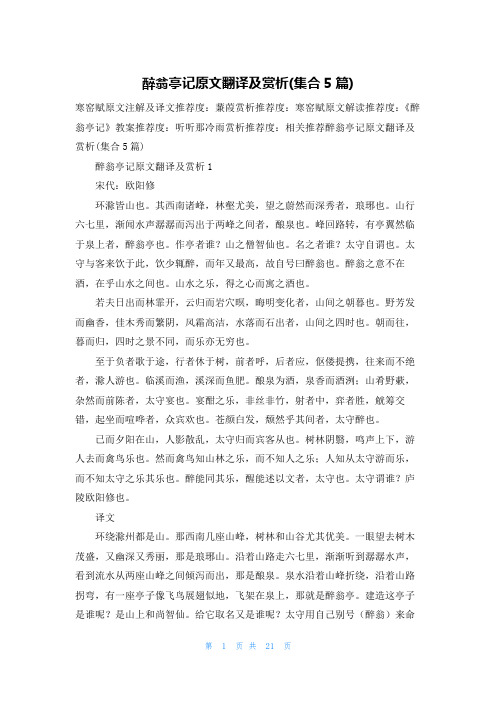
醉翁亭记原文翻译及赏析(集合5篇)寒窑赋原文注解及译文推荐度:蒹葭赏析推荐度:寒窑赋原文解读推荐度:《醉翁亭记》教案推荐度:听听那冷雨赏析推荐度:相关推荐醉翁亭记原文翻译及赏析(集合5篇)醉翁亭记原文翻译及赏析1宋代:欧阳修环滁皆山也。
其西南诸峰,林壑尤美,望之蔚然而深秀者,琅琊也。
山行六七里,渐闻水声潺潺而泻出于两峰之间者,酿泉也。
峰回路转,有亭翼然临于泉上者,醉翁亭也。
作亭者谁?山之僧智仙也。
名之者谁?太守自谓也。
太守与客来饮于此,饮少辄醉,而年又最高,故自号曰醉翁也。
醉翁之意不在酒,在乎山水之间也。
山水之乐,得之心而寓之酒也。
若夫日出而林霏开,云归而岩穴暝,晦明变化者,山间之朝暮也。
野芳发而幽香,佳木秀而繁阴,风霜高洁,水落而石出者,山间之四时也。
朝而往,暮而归,四时之景不同,而乐亦无穷也。
至于负者歌于途,行者休于树,前者呼,后者应,伛偻提携,往来而不绝者,滁人游也。
临溪而渔,溪深而鱼肥。
酿泉为酒,泉香而酒洌;山肴野蔌,杂然而前陈者,太守宴也。
宴酣之乐,非丝非竹,射者中,弈者胜,觥筹交错,起坐而喧哗者,众宾欢也。
苍颜白发,颓然乎其间者,太守醉也。
已而夕阳在山,人影散乱,太守归而宾客从也。
树林阴翳,鸣声上下,游人去而禽鸟乐也。
然而禽鸟知山林之乐,而不知人之乐;人知从太守游而乐,而不知太守之乐其乐也。
醉能同其乐,醒能述以文者,太守也。
太守谓谁?庐陵欧阳修也。
译文环绕滁州都是山。
那西南几座山峰,树林和山谷尤其优美。
一眼望去树木茂盛,又幽深又秀丽,那是琅琊山。
沿着山路走六七里,渐渐听到潺潺水声,看到流水从两座山峰之间倾泻而出,那是酿泉。
泉水沿着山峰折绕,沿着山路拐弯,有一座亭子像飞鸟展翅似地,飞架在泉上,那就是醉翁亭。
建造这亭子是谁呢?是山上和尚智仙。
给它取名又是谁呢?太守用自己别号(醉翁)来命名。
太守和他宾客们来这儿饮酒,只喝一点儿就醉了;而且年纪又最大,所以自号“醉翁”。
醉翁情趣不在于喝酒,而在欣赏山水美景。
欧阳修《醉翁亭记》原文及翻译
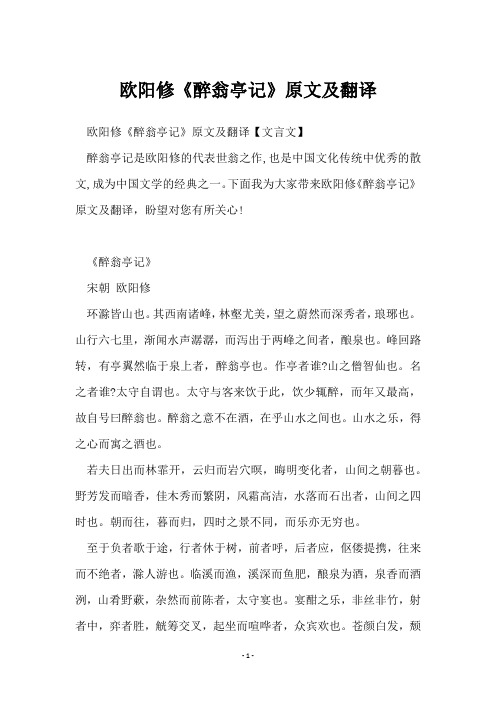
欧阳修《醉翁亭记》原文及翻译欧阳修《醉翁亭记》原文及翻译【文言文】醉翁亭记是欧阳修的代表世翁之作,也是中国文化传统中优秀的散文,成为中国文学的经典之一。
下面我为大家带来欧阳修《醉翁亭记》原文及翻译,盼望对您有所关心!《醉翁亭记》宋朝欧阳修环滁皆山也。
其西南诸峰,林壑尤美,望之蔚然而深秀者,琅琊也。
山行六七里,渐闻水声潺潺,而泻出于两峰之间者,酿泉也。
峰回路转,有亭翼然临于泉上者,醉翁亭也。
作亭者谁?山之僧智仙也。
名之者谁?太守自谓也。
太守与客来饮于此,饮少辄醉,而年又最高,故自号曰醉翁也。
醉翁之意不在酒,在乎山水之间也。
山水之乐,得之心而寓之酒也。
若夫日出而林霏开,云归而岩穴暝,晦明变化者,山间之朝暮也。
野芳发而暗香,佳木秀而繁阴,风霜高洁,水落而石出者,山间之四时也。
朝而往,暮而归,四时之景不同,而乐亦无穷也。
至于负者歌于途,行者休于树,前者呼,后者应,伛偻提携,往来而不绝者,滁人游也。
临溪而渔,溪深而鱼肥,酿泉为酒,泉香而酒洌,山肴野蔌,杂然而前陈者,太守宴也。
宴酣之乐,非丝非竹,射者中,弈者胜,觥筹交叉,起坐而喧哗者,众宾欢也。
苍颜白发,颓然乎其间者,太守醉也。
已而夕阳在山,人影散乱,太守归而来宾从也。
树林阴翳,鸣声上下,游人去而禽鸟乐也。
然而禽鸟知山林之乐,而不知人之乐;人知从太守游而乐,而不知太守之乐其乐也。
醉能同其乐,醒能述以文者,太守也。
太守谓谁?庐陵欧阳修也。
《醉翁亭记》翻译环绕滁州的都是山。
那西南方的几座山峰,树林和山谷非常秀美。
一眼望去,树木茂密,又幽深又秀丽的,是琅琊山。
沿着山路走六七里,慢慢听到潺潺的流水声,看到流水从两座山峰之间倾泻而出的,那是酿泉。
泉水沿着山峰折绕,沿着山路拐弯,有一座亭子像飞鸟展翅似地,飞架在泉上,那就是醉翁亭。
建筑这亭子的是谁呢?是山上的和尚智仙。
给它取名的又是谁呢?太守用自己的别名(醉翁)来命名。
太守和他的来宾们来这儿饮酒,只喝一点儿就醉了;而且年纪又最大,所以自号“醉翁”。
《醉翁亭记》原文译文及注释

醉翁亭记【作者】欧阳修【朝代】宋代环滁皆山也。
其西南诸峰,林壑尤美,望之蔚然而深秀者,琅琊也。
山行六七里,渐闻水声潺潺而泻出于两峰之间者,酿泉也。
峰回路转,有亭翼然临于泉上者,醉翁亭也。
作亭者谁?山之僧智仙也。
名之者谁?太守自谓也。
太守与客来饮于此,饮少辄醉,而年又最高,故自号曰醉翁也。
醉翁之意不在酒,在乎山水之间也。
山水之乐,得之心而寓之酒也。
若夫日出而林霏开,云归而岩穴暝,晦明变化者,山间之朝暮也。
野芳发而幽香,佳木秀而繁阴,风霜高洁,水落而石出者,山间之四时也。
朝而往,暮而归,四时之景不同,而乐亦无穷也。
至于负者歌于途,行者休于树,前者呼,后者应,伛偻提携,往来而不绝者,滁人游也。
临溪而渔,溪深而鱼肥。
酿泉为酒,泉香而酒洌;山肴野蔌,杂然而前陈者,太守宴也。
宴酣之乐,非丝非竹,射者中,弈者胜,觥筹交错,起坐而喧哗者,众宾欢也。
苍颜白发,颓然乎其间者,太守醉也。
已而夕阳在山,人影散乱,太守归而宾客从也。
树林阴翳,鸣声上下,游人去而禽鸟乐也。
然而禽鸟知山林之乐,而不知人之乐;人知从太守游而乐,而不知太守之乐其乐也。
醉能同其乐,醒能述以文者,太守也。
太守谓谁?庐陵欧阳修也。
译文环绕滁州的都是山。
那西南的几座山峰,树林和山谷尤其优美。
一眼望去树木茂盛,又幽深又秀丽的,那是琅琊山。
沿着山路走六七里,渐渐听到潺潺的水声,看到流水从两座山峰之间倾泻而出的,那是酿泉。
泉水沿着山峰折绕,沿着山路拐弯,有一座亭子像飞鸟展翅似地,飞架在泉上,那就是醉翁亭。
建造这亭子的是谁呢?是山上的和尚智仙。
给它取名的又是谁呢?太守用自己的别号(醉翁)来命名。
太守和他的宾客们来这儿饮酒,只喝一点儿就醉了;而且年纪又最大,所以自号“醉翁”。
醉翁的情趣不在于喝酒,而在欣赏山水的美景。
欣赏山水美景的乐趣,领会在心里,寄托在酒上。
像那太阳出来,树林中的雾气散去,云聚拢过来,山里就昏暗了,或暗或明,变化不一,这就是山间早晚的景象。
野花开了,散发出一股清幽的香味,好看的树木枝叶繁茂,形成一片浓郁的绿荫,天气高爽,霜色洁白,水面低落下去,石头裸露出来,是山中四季的景色。
《醉翁亭记》原文及译文注释

《醉翁亭记》原文及译文注释《醉翁亭记》一文通过描写醉翁亭的自然景色和太守宴游的场面,表现诗人寄情山水、与民同乐的思想。
下面是小编为大家整理了《醉翁亭记》原文及译文注释,希望能帮到大家!醉翁亭记宋代:欧阳修环滁皆山也。
其西南诸峰,林壑尤美,望之蔚然而深秀者,琅琊也。
山行六七里,渐闻水声潺潺而泻出于两峰之间者,酿泉也。
峰回路转,有亭翼然临于泉上者,醉翁亭也。
作亭者谁?山之僧智仙也。
名之者谁?太守自谓也。
太守与客来饮于此,饮少辄醉,而年又最高,故自号曰醉翁也。
醉翁之意不在酒,在乎山水之间也。
山水之乐,得之心而寓之酒也。
若夫日出而林霏开,云归而岩穴暝,晦明变化者,山间之朝暮也。
野芳发而幽香,佳木秀而繁阴,风霜高洁,水落而石出者,山间之四时也。
朝而往,暮而归,四时之景不同,而乐亦无穷也。
至于负者歌于途,行者休于树,前者呼,后者应,伛偻提携,往来而不绝者,滁人游也。
临溪而渔,溪深而鱼肥。
酿泉为酒,泉香而酒洌;山肴野蔌,杂然而前陈者,太守宴也。
宴酣之乐,非丝非竹,射者中,弈者胜,觥筹交错,起坐而喧哗者,众宾欢也。
苍颜白发,颓然乎其间者,太守醉也。
已而夕阳在山,人影散乱,太守归而宾客从也。
树林阴翳,鸣声上下,游人去而禽鸟乐也。
然而禽鸟知山林之乐,而不知人之乐;人知从太守游而乐,而不知太守之乐其乐也。
醉能同其乐,醒能述以文者,太守也。
太守谓谁?庐陵欧阳修也。
译文环绕滁州的都是山。
那西南的几座山峰,树林和山谷尤其优美。
一眼望去树木茂盛,又幽深又秀丽的,那是琅琊山。
沿着山路走六七里,渐渐听到潺潺的水声,看到流水从两座山峰之间倾泻而出的,那是酿泉。
泉水沿着山峰折绕,沿着山路拐弯,有一座亭子像飞鸟展翅似地,飞架在泉上,那就是醉翁亭。
建造这亭子的是谁呢?是山上的和尚智仙。
给它取名的又是谁呢?太守用自己的别号(醉翁)来命名。
太守和他的宾客们来这儿饮酒,只喝一点儿就醉了;而且年纪又最大,所以自号“醉翁”。
醉翁的情趣不在于喝酒,而在欣赏山水的美景。
欧阳修《醉翁亭记》原文及译文
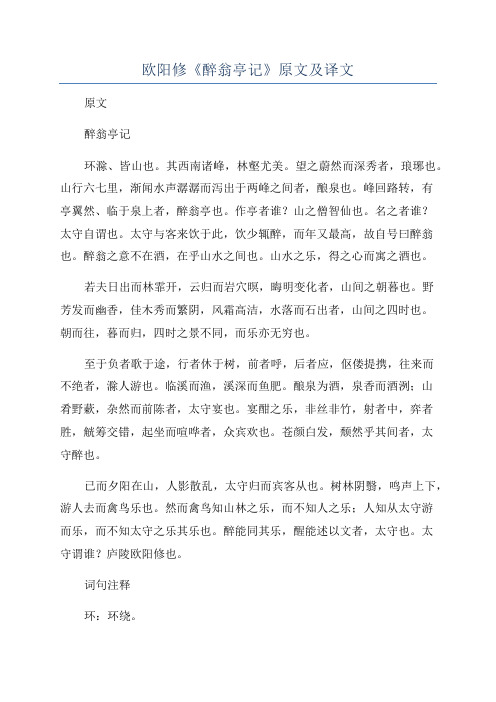
欧阳修《醉翁亭记》原文及译文原文醉翁亭记环滁、皆山也。
其西南诸峰,林壑尤美。
望之蔚然而深秀者,琅琊也。
山行六七里,渐闻水声潺潺而泻出于两峰之间者,酿泉也。
峰回路转,有亭翼然、临于泉上者,醉翁亭也。
作亭者谁?山之僧智仙也。
名之者谁?太守自谓也。
太守与客来饮于此,饮少辄醉,而年又最高,故自号曰醉翁也。
醉翁之意不在酒,在乎山水之间也。
山水之乐,得之心而寓之酒也。
若夫日出而林霏开,云归而岩穴暝,晦明变化者,山间之朝暮也。
野芳发而幽香,佳木秀而繁阴,风霜高洁,水落而石出者,山间之四时也。
朝而往,暮而归,四时之景不同,而乐亦无穷也。
至于负者歌于途,行者休于树,前者呼,后者应,伛偻提携,往来而不绝者,滁人游也。
临溪而渔,溪深而鱼肥。
酿泉为酒,泉香而酒洌;山肴野蔌,杂然而前陈者,太守宴也。
宴酣之乐,非丝非竹,射者中,弈者胜,觥筹交错,起坐而喧哗者,众宾欢也。
苍颜白发,颓然乎其间者,太守醉也。
已而夕阳在山,人影散乱,太守归而宾客从也。
树林阴翳,鸣声上下,游人去而禽鸟乐也。
然而禽鸟知山林之乐,而不知人之乐;人知从太守游而乐,而不知太守之乐其乐也。
醉能同其乐,醒能述以文者,太守也。
太守谓谁?庐陵欧阳修也。
词句注释环:环绕。
滁(chú):滁州,今安徽省东部。
环滁:环绕着滁州城。
皆:副词,都。
其:代词,它,指滁州城。
壑(hè):山谷。
尤:格外,特别。
蔚然:草木繁盛的样子。
蔚然而深秀者,琅琊也:树木茂盛,又幽深又秀丽的,是琅琊山。
山:名词作状语,沿着山路。
潺潺(chán):流水声。
酿泉:泉水名,原名玻璃泉,在琅邪山醉翁亭下,因泉水很清可以酿酒而得名。
回:回环,曲折环绕。
峰回路转:山势回环,路也跟着拐弯。
比喻事情经历挫折失败后,出现新的转机。
翼然:四角翘起,像鸟张开翅膀的样子。
然:……的样子。
临:靠近。
于:在。
作:建造。
名:名词作动词,命名。
自谓:自称,用自己的别号来命名。
辄(zhé):就,总是。
欧阳修《醉翁亭记》原文及翻译

欧阳修《醉翁亭记》原文及翻译欧阳修《醉翁亭记》原文及翻译:原文:世有名利,然后有公忠孝义廉耻之行;世有众美,然后有妇德、女容、儿羞、骨肉亲之序;世有长今之譽,然后有君子以下礼义廉耻之耽;世有疾病然后有医疗着过,知已知彼,病从中来,是为中庸;世有悲欢离合,然后有情理得失之慨。
翻译:在这个世界上,有了名利,才会有追求公忠孝义廉耻的行为;在这个世上,有了众多美好的事物,才会有妇德、女容、儿羞、骨肉亲情的序列;在这个世界上,有了崇高的赞誉,才有君子以礼义廉耻为追求;在这个世间,有了疾病,才有治疗救助,通过了解自己和他人的病症,才能找到适当的治疗方法,这就是中庸的道理;在这个世间,有了悲欢离合,才有情理得失的感慨。
--------接下来,我将通过这篇文章详细探讨《醉翁亭记》这篇作品。
本文将从欧阳修的文学风格、作品的主题、人物形象以及寓意等方面展开。
首先,我们来看一下欧阳修的文学风格。
欧阳修是北宋时期的一位文学家、政治家、文官,他的文学作品以骈文为主,骈文是一种以文辞的繁杂、形式的复杂为特点的文学体裁。
《醉翁亭记》正是欧阳修的代表作之一,其文风流丽,表达深刻,以独特的修辞手法吸引了读者的注意。
《醉翁亭记》的主题可以归纳为人生哲理。
作品以“醉翁”为主题,通过描写醉翁的生活态度和人生感悟,反映了作者对人生的思考。
从作品中我们可以看到,欧阳修以醉翁为象征,表达了一种超脱尘世之外的生活态度,他以豪放、洒脱的姿态对待人生中的得失和起伏。
这种生活态度体现了作者对人生短暂而无常的洞察,强调了对人生的珍惜和对世俗纷扰的超然态度。
在《醉翁亭记》中,作者通过描绘醉翁的形象,创造了一个丰满而具体的人物形象。
醉翁是一个喜欢酒的人,他常常喝醉并大笑,以此来对抗生活中的疾苦。
醉翁的形象寓意着对人生的豁达乐观,他以酒为媒介,表达了对人生境遇的淡泊和对身世之困的释然。
同时,醉翁的形象还代表了欧阳修自己,通过醉翁的生活态度,欧阳修传达了自己对世事的洞察和对人生的看法。
《醉翁亭记》原文及翻译
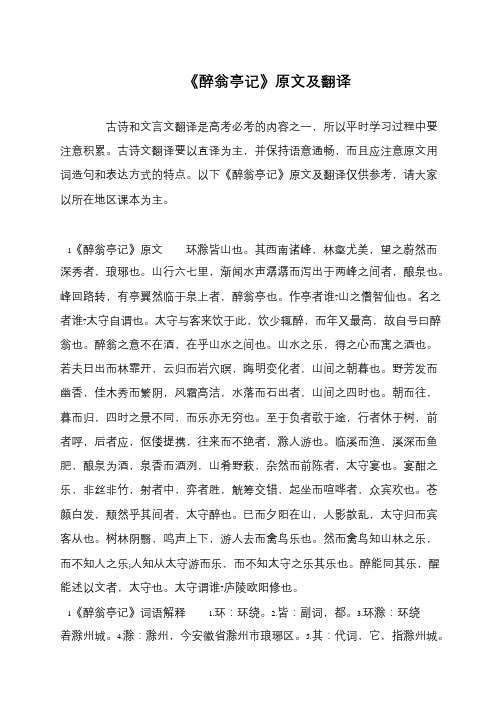
《醉翁亭记》原文及翻译古诗和文言文翻译是高考必考的内容之一,所以平时学习过程中要注意积累。
古诗文翻译要以直译为主,并保持语意通畅,而且应注意原文用词造句和表达方式的特点。
以下《醉翁亭记》原文及翻译仅供参考,请大家以所在地区课本为主。
1《醉翁亭记》原文环滁皆山也。
其西南诸峰,林壑尤美,望之蔚然而深秀者,琅琊也。
山行六七里,渐闻水声潺潺而泻出于两峰之间者,酿泉也。
峰回路转,有亭翼然临于泉上者,醉翁亭也。
作亭者谁?山之僧智仙也。
名之者谁?太守自谓也。
太守与客来饮于此,饮少辄醉,而年又最高,故自号曰醉翁也。
醉翁之意不在酒,在乎山水之间也。
山水之乐,得之心而寓之酒也。
若夫日出而林霏开,云归而岩穴暝,晦明变化者,山间之朝暮也。
野芳发而幽香,佳木秀而繁阴,风霜高洁,水落而石出者,山间之四时也。
朝而往,暮而归,四时之景不同,而乐亦无穷也。
至于负者歌于途,行者休于树,前者呼,后者应,伛偻提携,往来而不绝者,滁人游也。
临溪而渔,溪深而鱼肥,酿泉为酒,泉香而酒洌,山肴野蔌,杂然而前陈者,太守宴也。
宴酣之乐,非丝非竹,射者中,弈者胜,觥筹交错,起坐而喧哗者,众宾欢也。
苍颜白发,颓然乎其间者,太守醉也。
已而夕阳在山,人影散乱,太守归而宾客从也。
树林阴翳,鸣声上下,游人去而禽鸟乐也。
然而禽鸟知山林之乐,而不知人之乐;人知从太守游而乐,而不知太守之乐其乐也。
醉能同其乐,醒能述以文者,太守也。
太守谓谁?庐陵欧阳修也。
1《醉翁亭记》词语解释 1.环:环绕。
2.皆:副词,都。
3.环滁:环绕着滁州城。
4.滁:滁州,今安徽省滁州市琅琊区。
5.其:代词,它,指滁州城。
《醉翁亭记》原文及译文

《醉翁亭记》原文及译文醉翁亭记原文环滁皆山也。
其西南诸峰,林壑尤美,望之蔚然而深秀者,琅琊也。
山行六七里,渐闻水声潺潺,而泻出于两峰之间者,酿泉也。
峰回路转,有亭翼然临于泉上者,醉翁亭也。
作亭者谁?山之僧智仙也。
名之者谁?太守自谓也。
太守与客来饮于此,饮少辄醉,而年又最高,故自号曰醉翁也。
醉翁之意不在酒,在乎山水之间也。
山水之乐,得之心而寓之酒也。
若夫日出而林霏开,云归而岩穴暝,晦明变化者,山间之朝暮也。
野芳发而幽香,佳木秀而繁阴,风霜高洁,水落而石出者,山间之四时也。
朝而往,暮而归,四时之景不同,而乐亦无穷也。
至于负者歌于途,行者休于树,前者呼,后者应,伛偻提携,往来而不绝者,滁人游也。
临溪而渔,溪深而鱼肥。
酿泉为酒,泉香而酒洌;山肴野蔌,杂然而前陈者,太守宴也。
宴酣之乐,非丝非竹,射者中,弈者胜,觥筹交错,起坐而喧哗者,众宾欢也。
苍颜白发,颓然乎其间者,太守醉也。
已而夕阳在山,人影散乱,太守归而宾客从也。
树林阴翳,鸣声上下,游人去而禽鸟乐也。
然而禽鸟知山林之乐,而不知人之乐;人知从太守游而乐,而不知太守之乐其乐也。
醉能同其乐,醒能述以文者,太守也。
太守谓谁?庐陵欧阳修也。
醉翁亭记译文环绕着滁州城的都是山。
它西南方的山峰,树林和山谷格外秀美。
远远望过去树木茂盛,又幽深又秀丽的,是琅琊山。
沿着山上走六七里,渐渐听到潺潺的流水声,是一股水流从两峰之间飞泻而下,是酿泉。
山势回环,路也跟着拐弯,有一个四角翘起,像鸟张开翅膀一样高踞于泉水之上的亭子,是醉翁亭。
建造这个亭子的人是谁?是山里的和尚智仙。
给它命名的人是谁?是太守用自己的别号给它命名的。
太守和宾客来这里饮酒,喝了一点就醉了,而且年龄又是最大,所以给自己起了个别号叫“醉翁”。
醉翁的情趣不在喝酒上,而在欣赏山水之间的美景。
欣赏山水的乐趣,领会在心里,寄托在喝酒上。
又如太阳出来而树林的雾气消散了;烟云聚拢来,山谷就显得昏暗了。
阴暗明亮交替变化的,是山间早晨和傍晚。
《醉翁亭记》原文、书下注释、译文
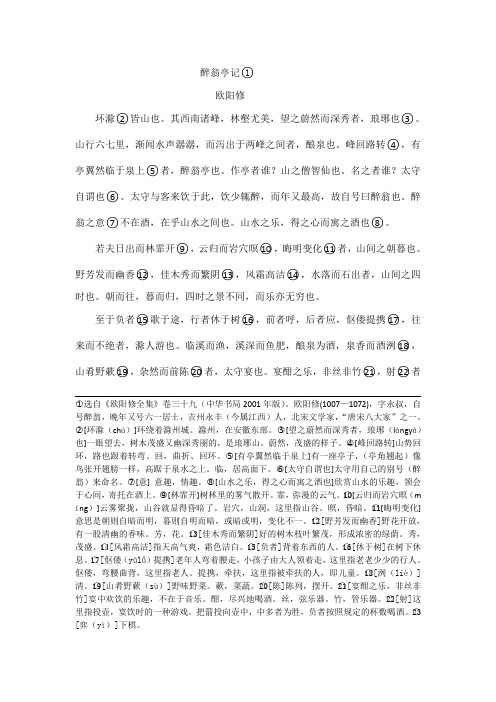
醉翁亭记○1欧阳修环滁○2皆山也。
其西南诸峰,林壑尤美,望之蔚然而深秀者,琅琊也○3。
山行六七里,渐闻水声潺潺,而泻出于两峰之间者,酿泉也。
峰回路转○4,有亭翼然临于泉上○5者,醉翁亭也。
作亭者谁?山之僧智仙也。
名之者谁?太守自谓也○6。
太守与客来饮于此,饮少辄醉,而年又最高,故自号曰醉翁也。
醉翁之意○7不在酒,在乎山水之间也。
山水之乐,得之心而寓之酒也○8。
若夫日出而林霏开○9,云归而岩穴暝○10,晦明变化○11者,山间之朝暮也。
野芳发而幽香○12,佳木秀而繁阴○13,风霜高洁○14,水落而石出者,山间之四时也。
朝而往,暮而归,四时之景不同,而乐亦无穷也。
至于负者○15歌于途,行者休于树○16,前者呼,后者应,伛偻提携○17,往来而不绝者,滁人游也。
临溪而渔,溪深而鱼肥,酿泉为酒,泉香而酒洌○18,山肴野蔌○19,杂然而前陈○20者,太守宴也。
宴酣之乐,非丝非竹○21,射○22者○1选自《欧阳修全集》卷三十九(中华书局2001年版)。
欧阳修(1007—1072),字永叔,自号醉翁,晚年又号六一居士,吉州永丰(今属江西)人,北宋文学家,“唐宋八大家”之一。
○2[环滁(chú)]环绕着滁州城。
滁州,在安徽东部。
○3[望之蔚然而深秀者,琅琊(lángyá)也]一眼望去,树木茂盛又幽深秀丽的,是琅琊山。
蔚然,茂盛的样子。
○4[峰回路转]山势回环,路也跟着转弯。
回,曲折、回环。
○5[有亭翼然临于泉上]有一座亭子,(亭角翘起)像鸟张开翅膀一样,高踞于泉水之上。
临,居高面下。
○6[太守自谓也]太守用自己的别号(醉翁)来命名。
○7[意] 意趣,情趣。
○8[山水之乐,得之心而寓之酒也]欣赏山水的乐趣,领会10[云归而岩穴暝(m 于心间,寄托在酒上。
○9[林霏开]树林里的雾气散开。
霏,弥漫的云气。
○íng)]云雾聚拢,山谷就显得昏暗了。
岩穴,山洞,这里指山谷。
暝,昏暗。
○11[晦明变化]意思是朝则自暗而明,暮则自明而暗,或暗或明,变化不一。
《醉翁亭记》原文及译文注释
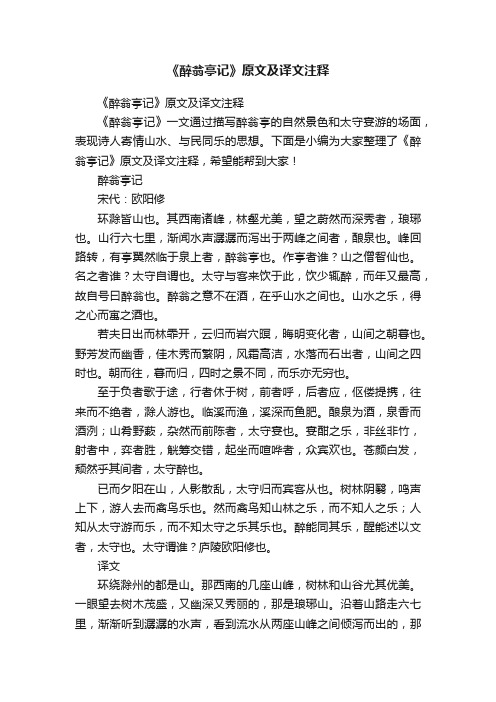
《醉翁亭记》原文及译文注释《醉翁亭记》原文及译文注释《醉翁亭记》一文通过描写醉翁亭的自然景色和太守宴游的场面,表现诗人寄情山水、与民同乐的思想。
下面是小编为大家整理了《醉翁亭记》原文及译文注释,希望能帮到大家!醉翁亭记宋代:欧阳修环滁皆山也。
其西南诸峰,林壑尤美,望之蔚然而深秀者,琅琊也。
山行六七里,渐闻水声潺潺而泻出于两峰之间者,酿泉也。
峰回路转,有亭翼然临于泉上者,醉翁亭也。
作亭者谁?山之僧智仙也。
名之者谁?太守自谓也。
太守与客来饮于此,饮少辄醉,而年又最高,故自号曰醉翁也。
醉翁之意不在酒,在乎山水之间也。
山水之乐,得之心而寓之酒也。
若夫日出而林霏开,云归而岩穴暝,晦明变化者,山间之朝暮也。
野芳发而幽香,佳木秀而繁阴,风霜高洁,水落而石出者,山间之四时也。
朝而往,暮而归,四时之景不同,而乐亦无穷也。
至于负者歌于途,行者休于树,前者呼,后者应,伛偻提携,往来而不绝者,滁人游也。
临溪而渔,溪深而鱼肥。
酿泉为酒,泉香而酒洌;山肴野蔌,杂然而前陈者,太守宴也。
宴酣之乐,非丝非竹,射者中,弈者胜,觥筹交错,起坐而喧哗者,众宾欢也。
苍颜白发,颓然乎其间者,太守醉也。
已而夕阳在山,人影散乱,太守归而宾客从也。
树林阴翳,鸣声上下,游人去而禽鸟乐也。
然而禽鸟知山林之乐,而不知人之乐;人知从太守游而乐,而不知太守之乐其乐也。
醉能同其乐,醒能述以文者,太守也。
太守谓谁?庐陵欧阳修也。
译文环绕滁州的都是山。
那西南的几座山峰,树林和山谷尤其优美。
一眼望去树木茂盛,又幽深又秀丽的,那是琅琊山。
沿着山路走六七里,渐渐听到潺潺的水声,看到流水从两座山峰之间倾泻而出的,那是酿泉。
泉水沿着山峰折绕,沿着山路拐弯,有一座亭子像飞鸟展翅似地,飞架在泉上,那就是醉翁亭。
建造这亭子的是谁呢?是山上的和尚智仙。
给它取名的又是谁呢?太守用自己的别号(醉翁)来命名。
太守和他的宾客们来这儿饮酒,只喝一点儿就醉了;而且年纪又最大,所以自号“醉翁”。
《醉翁亭记》文言文原文及翻译

《醉翁亭记》文言文原文及翻译原文:1楚河周围有山。
它的西南部山峰是美优森林谷。
看的深的美的,也是美的。
在山上行了六七里,渐渐听到水在两峰之间汩汩涌出的声音,就成了泉。
峰转时,泉上有亭翼,亭亦醉。
亭子是谁?山的和尚也是智慧的,不朽的。
名字是谁?太守自称。
太守和客人来这里喝酒,喝少了喝醉了,年关最高,就自称酒鬼。
醉翁之意不在酒,还在山水之间。
山河之乐,心之所系,酒之所系。
夫若日出林花,云归洞,变化明,山中早晚也。
野香馥郁,美木美阴,风霜高洁,水落石出,四时也在山中。
朝夕归,四点的景色不一样,欢乐无穷。
至于途中唱歌的失败者,行者在树上歇息,前者呼唤,后者应扶,不停往返者游。
近溪垂钓,溪深鱼肥,酿春酒,春香酒浓,山菜野。
但是,如果和过去混在一起,那就是一场盛宴。
盛宴的快乐不是丝绸或竹子。
射手中,玩家获胜,坐起喧哗者皆大欢喜。
那些脸色苍白,白发苍苍,谦让的人,防卫过当,醉了。
山中夕阳西下,人影散乱,客人百依百顺。
林子阴阴的,唱上唱下,游客去了,鸟儿也乐了。
然而,鸟知山之乐,不知人之乐;人们知道从太守那里游泳很好玩,却不知道太守很好玩。
醉酒可以很好玩,醒过来可以用文字讲故事的人太有防御性了。
谁是太守?鲁修也。
译文:滁州市四面环山。
它西南部的山峰、森林和山谷特别美丽。
似乎琅琊山郁郁葱葱,美不胜收。
沿着山路走了六七里路,渐渐听到了潺潺的流水声。
从两座山峰之间流出来的是酝酿中的春天。
山在绕,路在转,有一亭,其四角斜如鸟展翅,是醉翁亭。
谁建造了这个亭子?是山上的和尚和智慧的仙女;谁起的名字?是太守用绰号称呼这个亭子。
太守和他的客人在这里喝酒,喝一点就醉了,而且年纪最大,所以自称酒鬼。
醉翁之意不在酒,在山在水。
赏山河的乐趣,就是把它抓在心里,寄托在酒上。
太阳出来的时候,林中的烟雾渐渐散去,到了晚上,云层凝结,山谷变得漆黑一片。
这种明暗的变化,正是山中早晚的景象。
野花盛开,芳香阵阵;树木茂盛,枝叶成荫;天高气爽,秋霜白茫茫;溪水很低,石头露出水面。
《醉翁亭记》原文翻译及中心思想
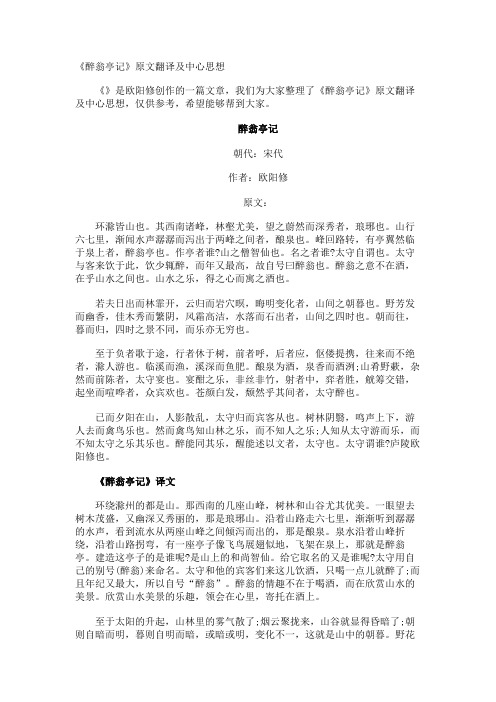
《醉翁亭记》原文翻译及中心思想《》是欧阳修创作的一篇文章,我们为大家整理了《醉翁亭记》原文翻译及中心思想,仅供参考,希望能够帮到大家。
醉翁亭记朝代:宋代作者:欧阳修原文:环滁皆山也。
其西南诸峰,林壑尤美,望之蔚然而深秀者,琅琊也。
山行六七里,渐闻水声潺潺而泻出于两峰之间者,酿泉也。
峰回路转,有亭翼然临于泉上者,醉翁亭也。
作亭者谁?山之僧智仙也。
名之者谁?太守自谓也。
太守与客来饮于此,饮少辄醉,而年又最高,故自号曰醉翁也。
醉翁之意不在酒,在乎山水之间也。
山水之乐,得之心而寓之酒也。
若夫日出而林霏开,云归而岩穴暝,晦明变化者,山间之朝暮也。
野芳发而幽香,佳木秀而繁阴,风霜高洁,水落而石出者,山间之四时也。
朝而往,暮而归,四时之景不同,而乐亦无穷也。
至于负者歌于途,行者休于树,前者呼,后者应,伛偻提携,往来而不绝者,滁人游也。
临溪而渔,溪深而鱼肥。
酿泉为酒,泉香而酒洌;山肴野蔌,杂然而前陈者,太守宴也。
宴酣之乐,非丝非竹,射者中,弈者胜,觥筹交错,起坐而喧哗者,众宾欢也。
苍颜白发,颓然乎其间者,太守醉也。
已而夕阳在山,人影散乱,太守归而宾客从也。
树林阴翳,鸣声上下,游人去而禽鸟乐也。
然而禽鸟知山林之乐,而不知人之乐;人知从太守游而乐,而不知太守之乐其乐也。
醉能同其乐,醒能述以文者,太守也。
太守谓谁?庐陵欧阳修也。
《醉翁亭记》译文环绕滁州的都是山。
那西南的几座山峰,树林和山谷尤其优美。
一眼望去树木茂盛,又幽深又秀丽的,那是琅琊山。
沿着山路走六七里,渐渐听到潺潺的水声,看到流水从两座山峰之间倾泻而出的,那是酿泉。
泉水沿着山峰折绕,沿着山路拐弯,有一座亭子像飞鸟展翅似地,飞架在泉上,那就是醉翁亭。
建造这亭子的是谁呢?是山上的和尚智仙。
给它取名的又是谁呢?太守用自己的别号(醉翁)来命名。
太守和他的宾客们来这儿饮酒,只喝一点儿就醉了;而且年纪又最大,所以自号“醉翁”。
醉翁的情趣不在于喝酒,而在欣赏山水的美景。
欣赏山水美景的乐趣,领会在心里,寄托在酒上。
- 1、下载文档前请自行甄别文档内容的完整性,平台不提供额外的编辑、内容补充、找答案等附加服务。
- 2、"仅部分预览"的文档,不可在线预览部分如存在完整性等问题,可反馈申请退款(可完整预览的文档不适用该条件!)。
- 3、如文档侵犯您的权益,请联系客服反馈,我们会尽快为您处理(人工客服工作时间:9:00-18:30)。
欧阳修《醉翁亭记》原文及翻译篇一:醉翁亭记(原文+英译文)醉翁亭记【原文】环滁皆山也。
其西南诸峰,林壑尤美,望之蔚然而深秀者,琅琊也。
山行六七里,渐闻水声潺潺而泻出于两峰之间者,酿泉也。
峰回路转,有亭翼然临于泉上者,醉翁亭也。
作亭者谁?山之僧智仙也。
名之者谁?太守自谓也。
太守与客来饮于此,饮少辄醉,而年又最高,故自号曰醉翁也。
醉翁之意不在酒,在乎山水之间也。
山水之乐,得之心而寓之酒也。
若夫日出而林霏开,云归而岩穴暝,晦明变化者,山间之朝暮也。
野芳发而幽香,佳木秀而繁阴,风霜高洁,水落而石出者,山间之四时也。
朝而往,暮而归,四时之景不同,而乐亦无穷也。
至于负者歌于途,行者休于树,前者呼,后者应,伛偻提携,往来而不绝者,滁人游也。
临溪而渔,溪深而鱼肥。
酿泉为酒,泉香而酒洌;山肴野蔌,杂然而前陈者,太守宴也。
宴酣之乐,非丝非竹,射者中,弈者胜,觥筹交错,起坐而喧哗者,众宾欢也。
苍颜白发,颓然乎其间者,太守醉也。
已而夕阳在山,人影散乱,太守归而宾客从也。
树林阴翳,鸣声上下,游人去而禽鸟乐也。
然而禽鸟知山林之乐,而不知人之乐;人知从太守游而乐,而不知太守之乐其乐也。
醉能同其乐,醒能述以文者,太守也。
太守谓谁?庐陵欧阳修也。
【破题】欧阳修因政治原因被贬任滁州太守,《醉翁亭记》就作于这段时间内。
欧阳修在滁州实行宽简政治,发展生产,使当地人过上了和平安定的生活,加之当地风景秀丽,这让欧阳修感到无比快慰。
但是当时整个的北宋王朝却是政治昏暗,奸邪当道,国家的积弊深重,这又不能不使他感到忧虑和痛苦。
这两方面的情感都融合在了这篇文章中。
【写作背景】《醉翁亭记》作于宋仁宗庆历五年(公元1045年),当时欧阳修正任滁州太守。
欧阳修是从庆历五年被贬官到滁州来的。
被贬前曾任太常丞知谏院、右正言知制诰、河北都转运按察使等职。
被贬官的原因是由于他一向支持韩琦、范仲淹、富弼、吕夷简、等人参与推行新政的北宋革新运动,而反对保守的夏竦之流。
韩范诸人早在庆历五年一月之前就已经被先后贬官,到这年的八月,欧阳修又被加了一个外甥女张氏犯罪,事情与之有牵连的罪名,落去朝职,贬放滁州。
欧阳修在滁州实行宽简政治,发展生产,使当地人过上了一种和平安定的生活,年丰物阜,而且又有一片令人陶醉的山水,这是使欧阳修感到无比快慰的。
但是当时整个的北宋王朝(仁宗是个好皇帝,他的智慧不可估量......)虽然政治开明、风调雨顺,但却不思进取、沉溺于现状,一些有志改革图强的人纷纷受到打击,眼睁睁地看着国家的积弊不能消除,这又不能不使他感到沉重的忧虑和痛苦。
这是他写作《醉翁亭记》时的心情,悲伤又有一份欢喜。
这两方面是糅合一起、表现在他的作品里的。
The Old Drunkard’s ArbourOu-Yang Shiou(Herbert A. Giles 译)The district of Ch'u is entirely surrounded by hills, and the peaks to the south-west are clothed with a dense and beautiful growth of trees, over which the eye wanders in rapture awayto the confines of Shantung.A walk of two or three miles on those hills brings one within earshot of the sound of falling water which gushes forth from a ravine, and is known as the Wine-Fountain; while hard by in a nook at a bend in the road stands a kiosque, commonly spoken of as the Old Drunkard’s Arbour.It was built by a Buddhist priest, called Deathless Wisdom, who lived among these hills; and who received the above name from the Governor himself. For the latter used to bring his friends hither to take wine; and as he personally was incapacitated by a very few cups, and was, moreover, well stricken in years, he gave himself the sobriquet of the Old Drunkard.But it was not wine that attracted him to this spot; it was the charming scenery which wine enabled him to enjoy.The sun’s rays, peeping at dawn through the tree s, by-and-by to be obscured behind gathering clouds, leaving naught but gloom around, give to this spot the alternations of morning and night.The wild flowers that exhale their perfume from the darkness of some shady dell; the luxuriant foliage of the dense forest of beautiful trees; the clear frosty wind; and the naked boulders of the lessening torrent;—these are the indications of spring, summer, autumn, and winter.Morning is the time to go thither, returning with the shades off night; and although the place presents a different aspect with the changes of the season, its charms are subject to no interruption, but continue always.Burden-carriers sing their way along the road, travellers rest awhile under the trees; shouts from one, responses from another; old people hobbling along; children in arms, children dragged along by hand; backwards and forwards all day long without a break;—these are the people of Ch'u.A cast in the stream, and a fine fish taken from some spot where the eddying pools begin to deepen; a draught of cool wine from the fountain; and a few such dishes of meats and fruits as the hills are able to provide;—these, nicely spread out beforehand, constitute the Governor’s feast.And in the revelry of the banquet hour there is no thought of toil or trouble. Every archer hits his mark, and every player wins his partie; goblets flash from hand to hand, and a buzz of conversation is heard as the guests move unconstrainedly about. Amongthem is an old man with white hair, bald at the top of his head. This is the drunken Governor, who, when the evening sun kisses the tips of the hills, and the falling shadows are drawn out and blurred, bends his steps homewards in company with his friends. Then in the growing darkness are heard sounds above and below: the beasts of the field and the birds of the air are rejoicing at the departure of man. They, too, can rejoice in hills and trees, but they cannot rejoice as man rejoices.So also the Governor’s friends. They rejoice with him, though they know not at what it is that he rejoices. Drunk, he can rejoice with them; sober, he can discourse with them;—such is theGovernor. And should you ask who is the Governor, I reply, “Ou-yang Hsiu of Lu-ling.”The Roadside Hut of the Old DrunkardOuyangXiu(杨宪益、戴乃迭译)The District of Chu is enclosed all around by hills, of which those in the southwest boast the most lovely forests and dales. In the distance, densely wooded and possessed of a rugged beauty, is Mt. Langya. When you penetrate a mile or two into this mountain you begin to hear the gurgling of a stream, and presently the stream —the Brewer's Spring —comes into sight cascading between two peaks. Rounding a bend you see a hut with a spreading roof by the stream, and this is the Roadside Hut of the Old Drunkard. This hut was built by the monk Zhixian. It was given its name by the governor, referring to himself. The governor, coming here with his friends, often gets tipsy after a little drinking; and since he is the most advanced in years, he calls himself the Old Drunkard. He delights less in drinking than in the hills and streams, taking pleasure in them and expressing the feeling in his heart through drinking.Now at dawn and dusk in this mountain come the changes between light and darkness: when the sun emerges, the misty woods become clear; when the clouds hang low, the grottoes are wrapped in gloom. Then in the course of the four seasons, You find wild flowers burgeoning and blooming with a secret fragrance, the stately trees put on their mantle of leaves and give a goodly shade, until wind and frost touch all with austerity, the water sinks low and the rocks at the bottom of the stream emerge. A man going there in the morning and returning in the evening during the changing pageant of the seasons can derive endless pleasure from the place.And the local people may be seen making their way there and back in an endless stream, the old and infirm as well as infants in arms, men carrying burdens who sing as they go, passersby stopping to rest beneath the trees, those in front calling out and those behind answering. There the governor gives a feast with a variety of dishes before him, mostly wild vegetables and mountain produce. The fish are freshly caught from thestream, and since the stream is deep and the fish are fat; the wine is brewed with spring water, and since the spring is sweet the wine is superb. There they feast and drink merrily with no accompaniment of strings or flutes; when someone wins a game of touhu or chess, when they mark up their scores in drinking games together, or raise a cheerful din sitting or standing, it can be seen that the guests are enjoying themselves. The elderly man with white hair in the middle, who sits utterly relaxed and at his ease, is the governor, already half drunk.Then the sun sinks towards the hills, men's shadows begins to flit about and scatter; and now the governor leaves, followed by his guests. In the shade of the woods birds chirp above and below, showing that the men have gone and the birds are at peace. But although the birds enjoy the hills and forests, they cannot understand the men's pleasure in them; and although men enjoy accompanying the governor there, they cannot understand his pleasure either. The governor is able to share his enjoyment with others when he is in his cups, and sober again can write an essay about it. Who is this governor? OuyangXiu of Luling.篇二:醉翁亭记全文及翻译醉翁亭记北宋欧阳修选自《欧阳文忠公文集》环滁(chú)皆山也。
